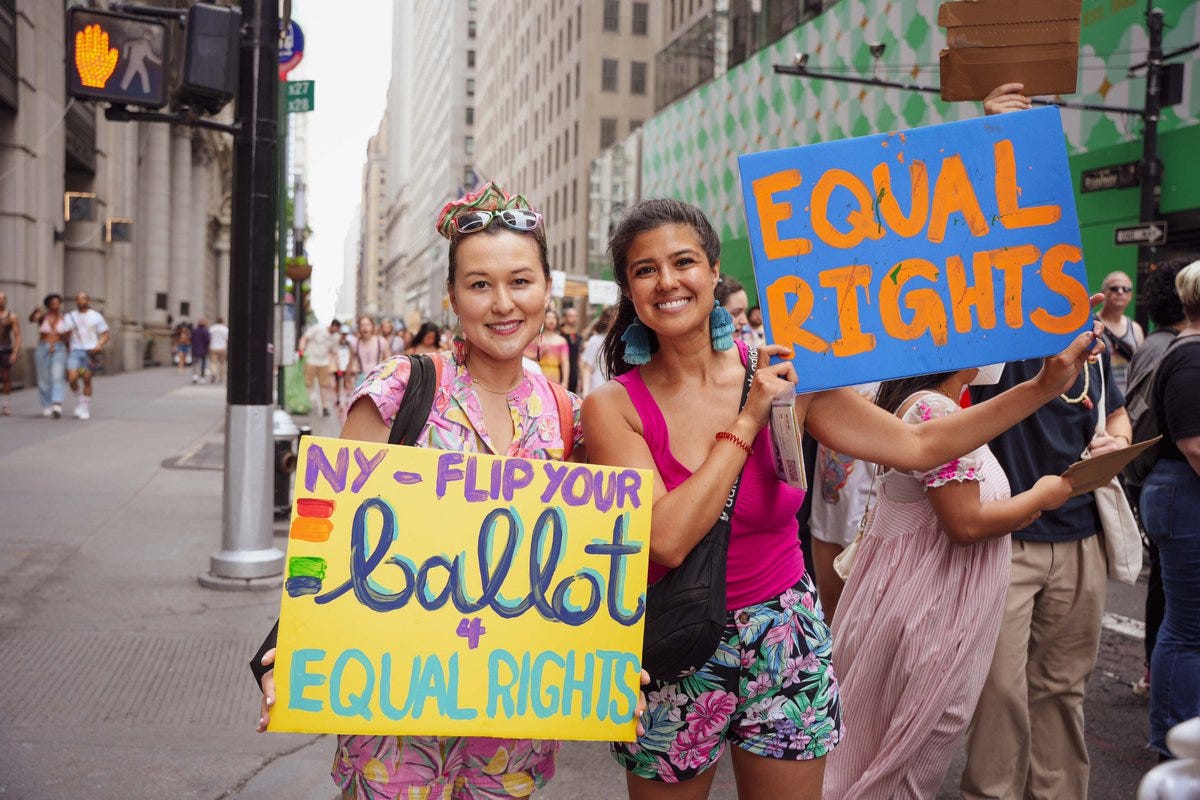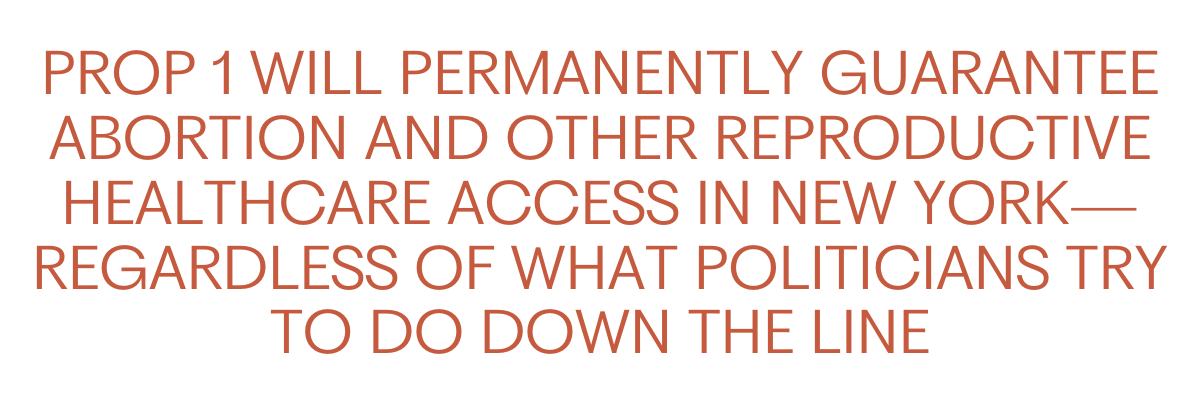Sasha Ahuja is the Campaign Director for New Yorkers for Equal Rights.
Everyone deserves the freedom to control our own lives, futures, and healthcare decisions, including our right to abortion. In New York, we’re trying to finally make that a reality permanently.
Two years since the overturn of Roe v Wade, and we’re living in a world few wanted: half the states in the country have abortion bans, overlapping with those where even birth control and IVF are in jeopardy. People living in states where abortion and broader reproductive rights have been rescinded have lost the fundamental right to control their own bodies, lives, and futures—with no telling if or how they’ll get it back. People elsewhere—like in New York where I live, work and am raising my daughter—are looking on in horror and doing their best to fight on their behalf.
When Dobbs was decided, New York became known as a safe haven for reproductive healthcare; people assume that there is no risk to abortion rights here. But that’s a dangerous assumption that overlooks the very real threats to and vulnerabilities of reproductive healthcare rights in New York. The truth is that none of our rights are as safe, regardless of where we live.
Despite New York’s progressive reputation on reproductive rights, the state only passed true reproductive health protections just a few years ago, in 2019. That’s because the 2018 election put lawmakers who support abortion rights in control of both houses of the State Legislature for the first time in a decade. Prior attempts to pass similar legislation were blocked by anti-abortion legislators who held the majority in the state senate.
Like any state law, New York’s laws—including abortion rights—can be repealed or changed through a vote in the State Legislature and a sign-off from the Governor.
This scenario is hardly far-fetched. Again, pro-abortion legislators didn’t control the State Legislature until quite recently. In the last decade alone, New York legislators introduced 53 anti-abortion and anti-reproductive rights bills. And in the 2022 election, New York saw the largest shift to the right of any state in the nation—and a staunchly anti-abortion candidate came within five points of winning the Governor’s Mansion. If elected, he had promised to appoint an anti-abortion extremist as the state health minister.
This is all to say that the political winds can and do shift—even in a state like New York. And laws shift along with them. A constitutional amendment, on the other hand, cements our rights permanently.
In November, New Yorkers will vote on Proposal 1, which would add the New York Equal Rights Amendment to our state Constitution. Prop 1 closes loopholes in the New York constitution so that people in this state—regardless of gender, age, ethnicity, pregnancy status, disability status, or whether someone is LGBT—can never be discriminated against by the government.
Crucially, the amendment would prohibit discrimination based on pregnancy, pregnancy outcomes, and reproductive healthcare and autonomy—blocking any government action to curtail a person’s access to reproductive healthcare, including abortion. In other words, Prop 1 will permanently guarantee abortion and other reproductive healthcare access in New York—regardless of what politicians try to do down the line.
And here’s what makes Prop 1 different: While other states have equal rights amendments that cover a person’s sex, they don’t include the explicit reproductive healthcare- and pregnancy-related provisions that Prop 1 does. It’s a powerful framework for cementing fundamental freedoms and guaranteeing reproductive healthcare rights in a post-Roe world.
But again, New York isn’t immune to the power of the anti-abortion movement, and as has happened in every state considering a pro-choice amendment, anti-abortion activists and lawmakers here have launched a well-organized, sustained effort to kill Prop 1. They know voters support abortion rights, so they want to keep New Yorkers from having the chance to vote on the issue.
In late 2023, anti-abortion Assembly member Marjorie Brynes filed a lawsuit to remove Prop 1 from the ballot, baselessly claiming that we hadn’t followed the procedure for passing the amendment through the State Legislature. A lower court accepted that claim and kicked Prop 1 off the ballot. Thankfully, the amendment was restored to November’s ballot by the New York Appellate Division, but the attacks didn’t end there. Anti-abortion operatives have repeatedly tried to appeal to New York’s highest court. And while these attempts have been denied, this legal challenge is just one of many.
While anti-abortion politicians try to stop New Yorkers from voting on Prop 1, anti-abortion groups have waged an aggressive war in the press, planting misinformation and lies about what the amendment would do. They’re doing everything they can to scare people into believing that Prop 1 is in service of some kind of radical agenda, rather than the truth: the amendment is a permanent safeguard for abortion and other rights that New Yorkers are overwhelmingly in favor of.
Anti-abortion groups and lawmakers also want New Yorkers to believe that Prop 1 isn’t necessary to protect reproductive rights, saying abortion is already legal in the state. But if abortion rights were entirely safe, why would there be such a concerted effort to undermine an amendment that would simply affirm that in the State Constitution? And why would that effort be almost entirely funded by anti-abortion activists? It’s because unlike most New Yorkers, Prop 1’s opponents don’t see these rights as a given—they see protections for our bodies and freedom as up for grabs. And they know that passing Prop 1 will definitively close the door on their future attempts to restrict and ban abortion.
The last two years have shown that we should never take our fundamental freedoms for granted. We’ve watched as legislators in state after state have banned abortion against voters wishes: like in Iowa, where the overwhelming majority of voters are pro-abortion, yet extremist legislators used Dobbs to strip Iowans of their reproductive rights. Or in Florida, where anti-abortion lawmakers enacted a 6-week abortion ban even though a majority of voters support abortion rights.
The anti-abortion movement will stop at nothing to roll back our rights, no matter where we live. And while New Yorkers may feel insulated from the national battle over abortion rights, we can’t rely on the status quo, elected officials, or the courts to protect us.
New Yorkers support abortion. But as we’ve seen elsewhere, voter support for reproductive rights doesn’t always translate into being allowed to keep them—not without constitutional protections. Prop 1 puts the power to safeguard our most fundamental freedoms in voters’ hands. New Yorkers now have the opportunity to proactively stand up for and secure our reproductive rights. It’s imperative that we not let it go to waste.
Visit nyequalrights.org to chip in what you can or volunteer to pass Proposal 1 so we can protect our most fundamental rights – including the right to an abortion – this fall.






The awareness about this proposal is really low in New York state. My friend and I canvassed this weekend at a farmers market and out of the 100 people we spoke to about 4 had heard about this. The New York Democratic Party is terrible and they are not doing ANYTHING to bring awareness of the issue - so if you are in New York TELL ALL YOUR FRIENDS. Have them tell THEIR FRIENDS. People just need to be made aware. I usually work the polls and most people have no idea what the initiatives on the ballot even mean - so the more informed they are before they vote the better. Seriously - we need to get the word out across the board!!
I live in New York, and this is the first I’ve heard about this proposal. Wow. I immediately posted about it to the beloved 🫤 Facebook app. This is hugely important. I don’t have a tv and stopped my subscription to the local paper. While I keep up on national news, I probably don’t do as good a job with state and local news. So maybe people other than me are more likely to know. I hope so.